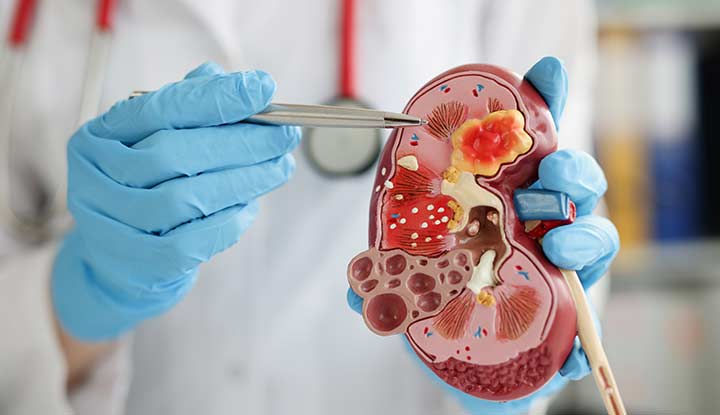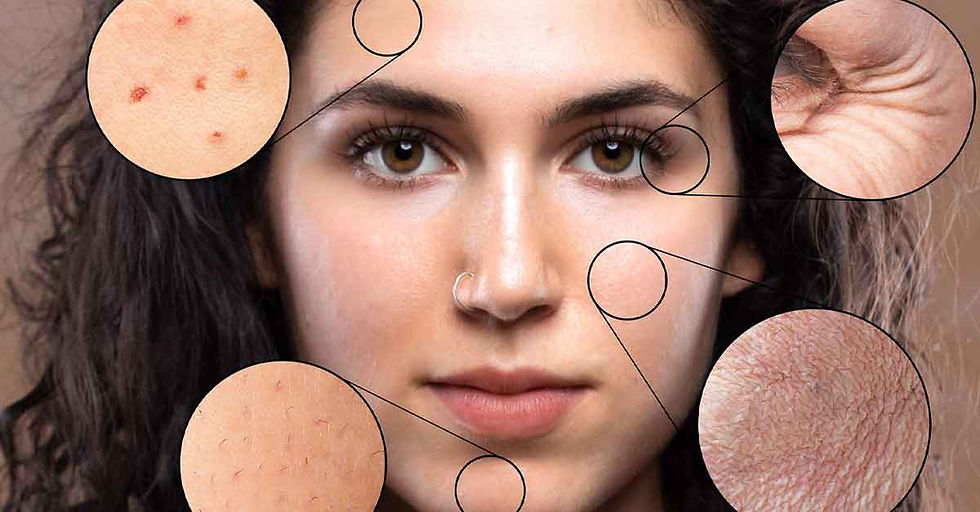ALL YOU NEED TO KNOW ABOUT KIDNEY STONES
- Medstar Hospital
- Oct 19, 2023
- 5 min read
It creates some sort of disturbance, right? Ripples will be created and it disturbs the peaceful nature of the smooth flowing of that water body. The same happens in our bodies also. Do you wonder how? Let me tell you in detail. There is an important part in our body that does all the filtering processes for our body. Yes, those two bean-shaped organs, which we call kidneys, filter half a cup of blood every minute to remove the wastes and excess water. They are vital organs which maintain fluid balance in our body. So when kidneys are struck with pain, isn't that a disturbance? A major cause of discomfort in kidneys which is very common is the presence of stones in kidneys. Let us analyse in detail what are kidney stones, their causes, symptoms, diagnosis, treatment and most importantly, prevention.
What are Kidney stones and what causes kidney stones?
At times, there are chances for hard deposits of minerals and acid salts to get stuck to concentrated urine. Even though they do not cause any permanent damage, they are very much painful while passing through the urinary tract. Such small yet hard deposits that are formed in our kidneys are termed kidney stones. Kidney stone is a very common medical condition that requires medical diagnosis and it is very well treatable. Kidney stones when treated by an expert medical professional can be resolved within days or in certain cases a couple of weeks. In any way, it is a short-term medical situation. Kidney stones usually cause sharp cramping pain in the abdomen as waves. The pain comes and goes as the body tries to get rid of the kidney stone. The major causes of kidney stones are irregularities in diet, excess body weight and certain medical supplements. It can affect any part of our urinary tract from the kidneys to the urinary bladder.
What are the types of Kidney stones?
Urine has different kinds of wastes dissolved in it. Too much waste in too little liquid leads to the formation of crystals and the type of crystal formed determines the type of kidney stone. The stone-forming chemicals are calcium, oxalate, urate, cystine, xanthine, and phosphate. Kidney stones are categorised into four types namely calcium oxalate, uric acid, struvite, and cystine. Calcium oxalate is the most common type of kidney stone which is created when calcium combines with oxalate in the urine. Uric acid is also a common type of kidney stone. High purine intake due to the consumption of organ meats and shellfish leads to the production of monosodium urate, which, under the right conditions, forms stones in the kidneys. Infections in the upper urinary tract cause Struvite type of kidney stone which is less common. When there is too much cystine in the urine, kidney stones can form. This is a very rare type of kidney stone, yet very serious. Cystine stones are caused by a rare disorder
called cystinuria. Cystine stones tend to reoccur and are typically larger than other kidney stones. It is a lifelong condition that can be controlled, but not cured.
What are the symptoms of Kidney stones?
Kidney stones are like silent intruders. They don't show any symptoms until they move around the kidney or pass on to the bladder. If kidney stones pass through the ureter tubes which connect the kidneys with the bladder, it blocks the urine flow and is highly painful. This shows the symptom of swelling kidneys and spasms in the ureter. Pain is the main indication of the presence of a kidney stone and it is very sharp felt on the side and back, below the ribs. Apart from radiating severe pain, the other symptoms include discolouration of urine as red, pink or brown; foul-smelling urine with a cloudy pattern; a persistent urge to urinate, but that too in very small quantities; and finally vomiting and nausea. If there is an infection, there are chances for fever also.
Diagnosis and Treatment of Kidney stones
As there are different types of kidney stones and there are variations in their treatment procedure, diagnosis of kidney stones is highly important. The diagnosis of kidney stones starts with an understanding of medical history which is followed by a physical examination and imaging tests. Imaging tests are very important to determine the size and shape of the kidney stone formed. High-resolution CT scans are mostly preferred for imaging. KUB X-rays are also used to know the exact size and position of stones. KUB tests are good to monitor kidney stones before and after treatment. In some cases, doctors will opt for an intravenous pyelogram for diagnosis. After the diagnosis, comes the treatment. The treatment depends on the size of the stone. For small kidney stones, doctors try to let the stone pass without surgery and ask the patients to drink a lot of water. If the time is too large or there are signs of infection, surgery is recommended. Shock-wave lithotripsy is a noninvasive procedure that uses high-energy sound waves to crash the stones into fragments to make them easily pass out in the urine. In ureteroscopy, an endoscope is inserted through the ureter to obliterate the stone. Rarely, for complicated stones, doctors will use percutaneous nephrolithotomy/nephrolithotripsy.
Prevention of Kidney stones as well as home remedies
There is no doubt that prevention is always better than cure. So let us look into how we can prevent the formation of kidney stones. The best way to prevent kidney stones is to make sure you drink plenty of water daily. Dehydration should be stopped at any cost. It is advisable to avoid high-purine foods such as red meat, organ meats, and shellfish, and follow a healthy diet that contains vegetables, fruits, whole grains, and low-fat dairy products. It is also good to avoid sugar-sweetened food and drink, especially those that contain high fructose. There are a host of home
remedies available for the prevention of kidney stones. Try to stay hydrated and increase citric acid and magnesium intake. Limit foods high in oxalates and animal protein. Ensure enough calcium for the body and consume less salt.
Get the most affordable Kidney Stone Surgery Package at Medstar speciality hospital In Bangalore, KA, India
Conclusion
A major issue with kidney stones is that they do not have a single definite cause. Kidney stones are formed whenever our urine contains more crystal-forming substances than the urine can dilate. When our urine cannot prevent these crystal-like substances from sticking together, it increases the risk of the formation of kidney stones. Pain caused by kidney stones is of radiating type and fluctuates in intensity. There will be a burning sensation while urinating which is extremely inconvenient. At any cost, kidney stone formation has to be prevented. It is very easy if we follow a healthy diet. Loss of water is a major cause of kidney stones. Yoga and heavy workouts lead to heavy sweat and lesser urine production. All these can easily be solved with a little care. Keep in mind that the painful experience of a passing kidney stone is not always a one-time event. Having even one stone greatly increases your chances of having another!










Скачайте последнюю версию нулс бравл скачать и играйте на приватном сервере Brawl Stars с неограниченными кристаллами, монетами и ящиками. Откройте всех бойцов, устраивайте собственные матчи и наслаждайтесь эксклюзивными функциями вместе с друзьями бесплатно.
The goal in moto x3m is to complete each course as quickly as possible.
When you throw a stone into a calm water body, it creates ripples, disturbing the otherwise smooth flow of the water. Similarly, when our kidneys are affected by stones, it causes a disturbance in the balance of our body’s internal processes. The kidneys, crucial for filtering waste and maintaining fluid balance, are vital for our well-being. Just like the precision of embroidery digitizing in creating a flawless design, our kidneys must function properly to keep everything in balance. Kidney stones can cause significant discomfort, but understanding their causes and prevention can help maintain that balance.
The Foundation of Nursing Services
Direct patient care is the most fundamental aspect of nursing services. Nurses are responsible for performing a diverse range of clinical tasks essential to patient management. These tasks include monitoring vital signs, administering medications, and executing medical procedures. For instance, in a neonatal intensive care unit (NICU), nurses are tasked with managing the care of premature infants, including administering IV fluids, monitoring oxygen levels, and conducting routine assessments. The expertise and attentiveness of nurses in these scenarios are critical for ensuring patient safety, preventing complications, and facilitating nursing writing services. The quality of direct patient care provided by nurses significantly affects health outcomes and underscores their essential role in healthcare.
Enhancing Healthcare Delivery
Nursing services are a fundamental component of the healthcare system, contributing to the overall effectiveness and quality of patient care. The role of nurses extends far beyond basic medical tasks; they are essential in delivering comprehensive care, promoting patient cheap nursing writing services, and ensuring the smooth functioning of healthcare environments. This essay explores the diverse responsibilities of nursing services, their impact on patient outcomes, and the challenges faced by nurses in their profession.